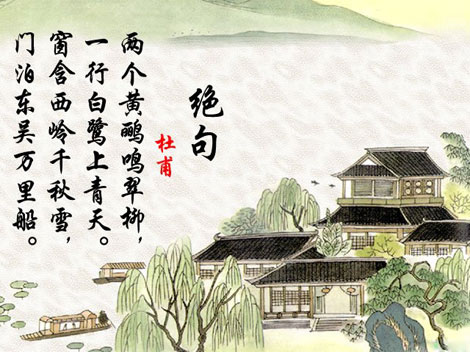
Jueju (绝句) is a style of jintishi, or "Modern shi poetry", that grew popular among Chinese poets in the fifth to sixth centuries in the Tang Dynasty. Jueju poems are always quatrains, with each line consisting of five or seven syllables each.
The five-syllable-long form is called wujue (五绝) and the seven-syllable-long form qijue (七绝)
History
The origins of the jueju style are uncertain. The wujue form may have developed from the pentasyllabic yuefu song form, dominant in the Six Dynasties period, as it carried over into shi composition. The result is a hybrid of yuefu quatrain and shi quatrain. Indeed, many Tang dynasty wujue poems were inspired by these yuefu songs.
The jueju style was very popular during the Tang dynasty. Many authors composing jueju poems at the time followed the concept of "seeing the big within the small" (小中见大), and thus wrote on topics of a grand scale; philosophy, religion, emotions, history, vast landscapes and more.
Authors known to have composed jueju poems include Du Fu, Du Mu, Li Bai, Li Shangyin, Wang Changling and Wang Wei.
Form
Traditional literary critics considered the jueju style to be the most difficult form of jintishi. Limited to exactly 20 or 28 characters, writing a jueju requires the author to make full use of each character to create a successful poem. This proved to encourage authors to use symbolic language to a high degree.
Furthermore, tonal meter in jueju, as with other forms of Chinese poetry, is a complex process. It can be compared to the alternation of stressed and unstressed syllables in sonnets. A poet writing a jueju or similar lüshi-style poem needs to alternate level and oblique tones both between and within lines.
We Recommend
